Focus on Global Innovative Networks
Journal: more than 120 international guests attended the “AC21 International Forum 2016” from April 30 through May 3 at the TU Chemnitz
-
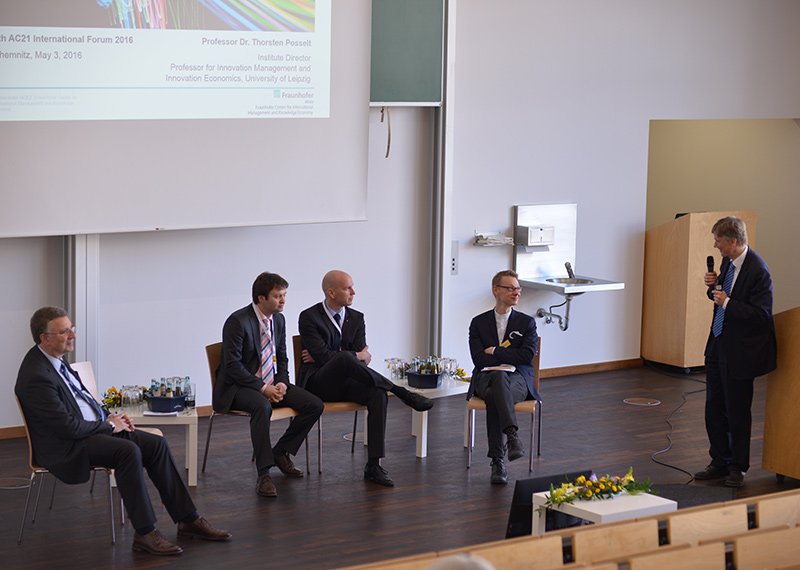
Day 4: The last day of the International Forum began with an event which focused on examining a role model and best practices for creating networks with scientific, economic, political or societal partners in a global context. All photos: TU Chemnitz -
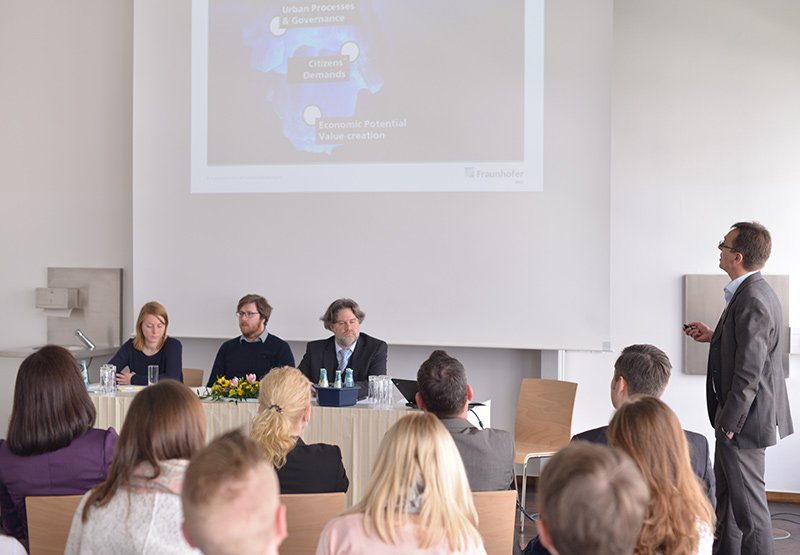
In one of the parallel sessions, the prospects for the Chemnitz “Morgenstadt-Project” from the Fraunhofer-Gesellschaft were presented. -
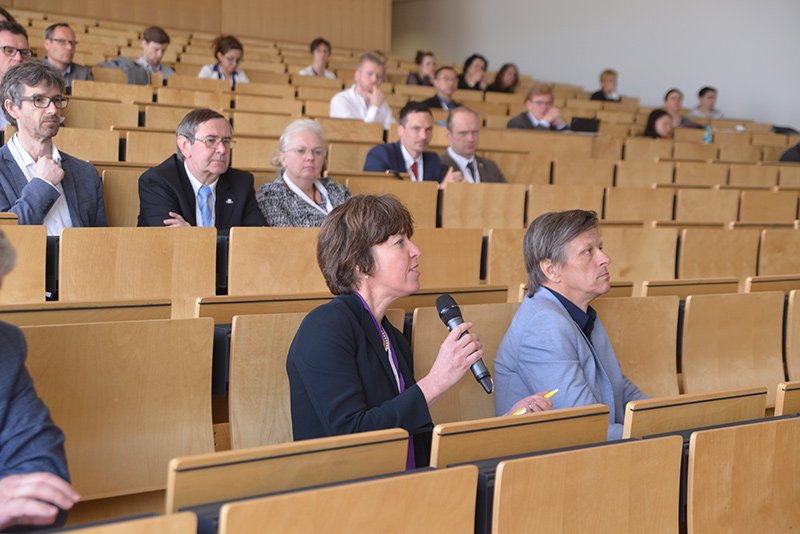
During all scheduled events, there was the possibility for discussion and exchange. -
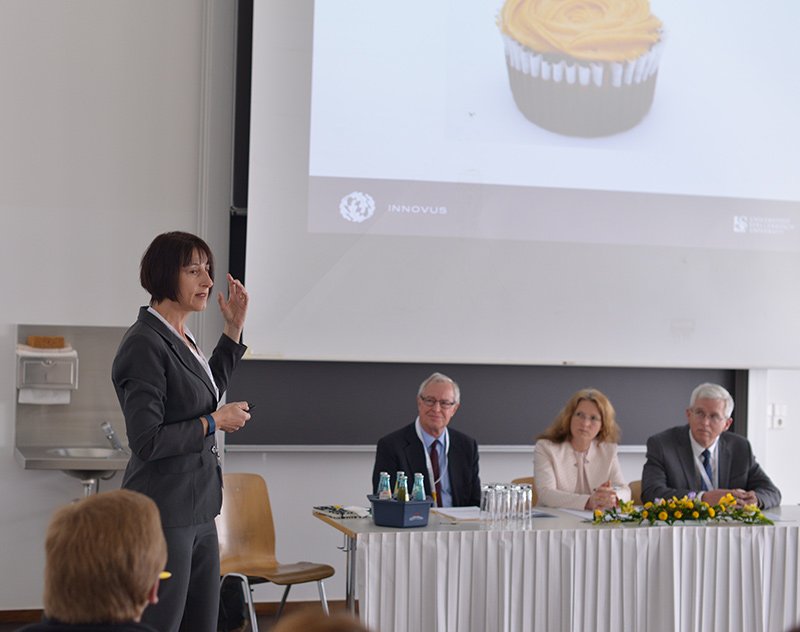
An additional workshop was held under the theme of “Identifying key innovation drivers and creating appropriate framework conditions and infrastructures.” -
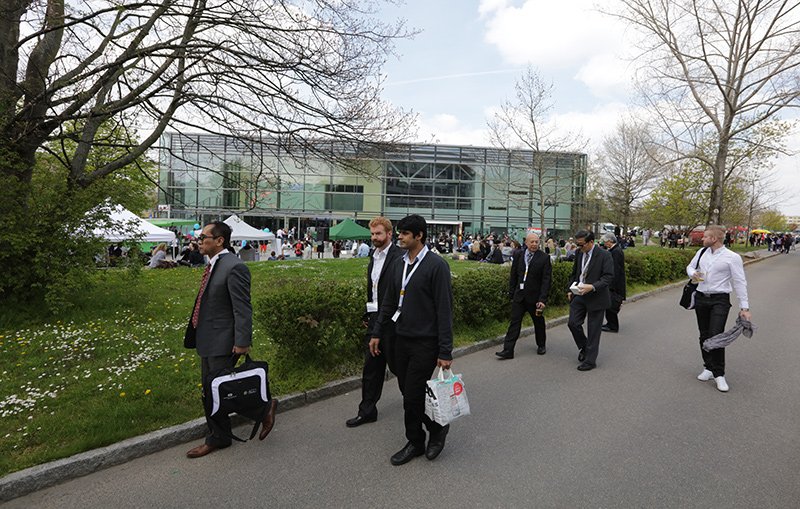
Guests enjoyed their lunch break with a visit to the TU Chemnitz Campus and Sport Fest. -
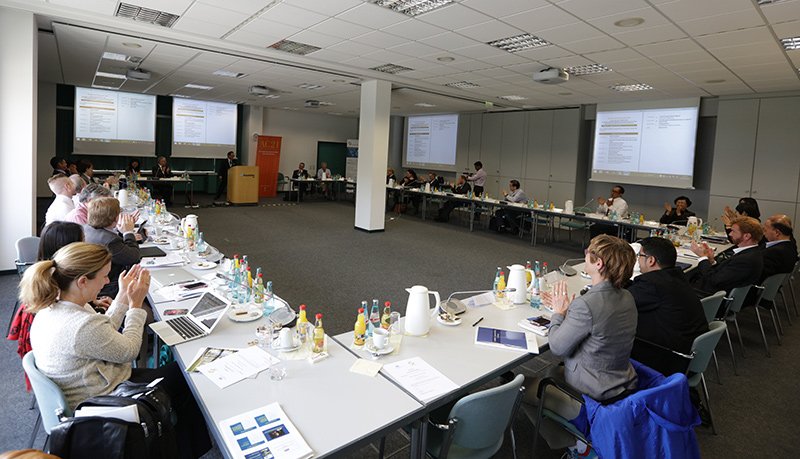
At the meeting of the General Assembly, representatives from member universities discussed the network’s future. -
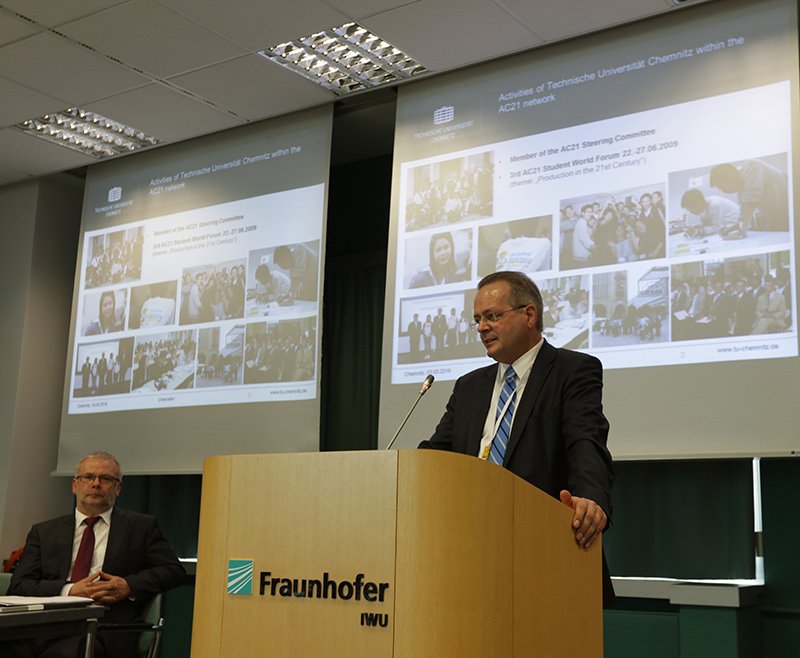
TU Chancellor Eberhard Alles presented the activities of the TU Chemnitz in the framework of AC21. -
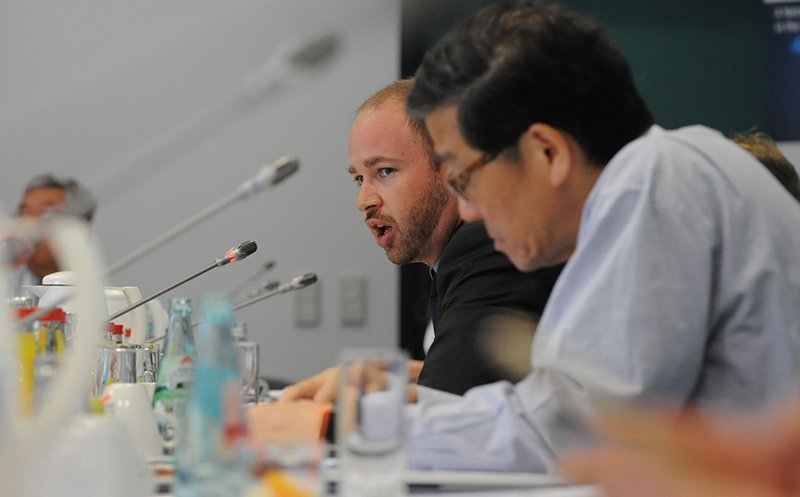
General Assembly members participated in the discussion. -
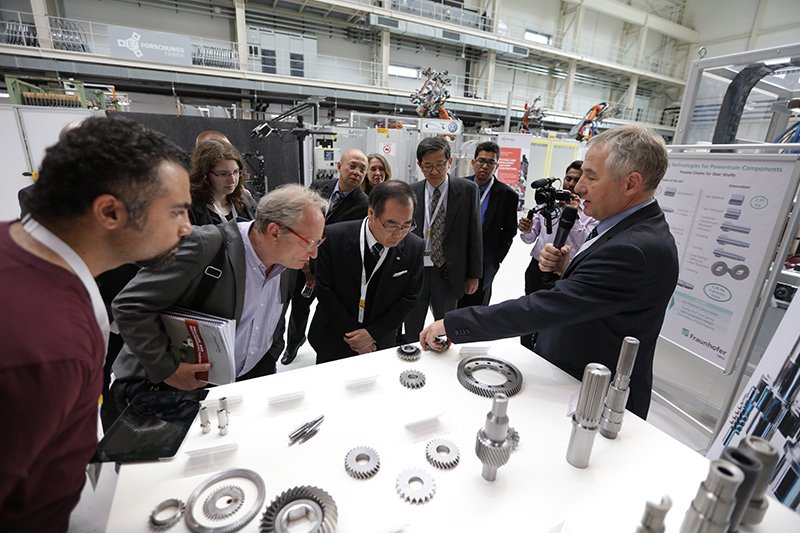
During a tour of the Fraunhofer Institute for Machine Tools and Forming Technology, Prof. Dr. Matthias Putz presented various projects in which the IWU cooperates with the TU Chemnitz. -
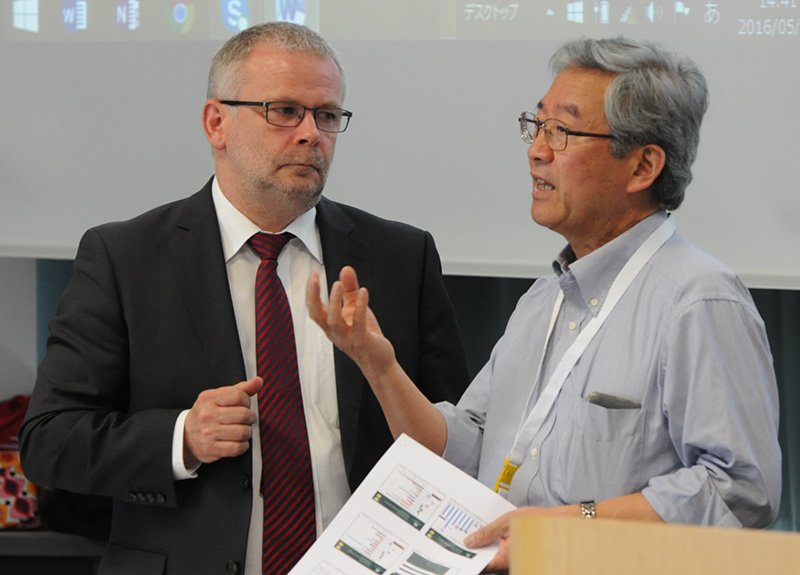
Between scheduled events, participants took advantage the opportunity to talk with one another. -
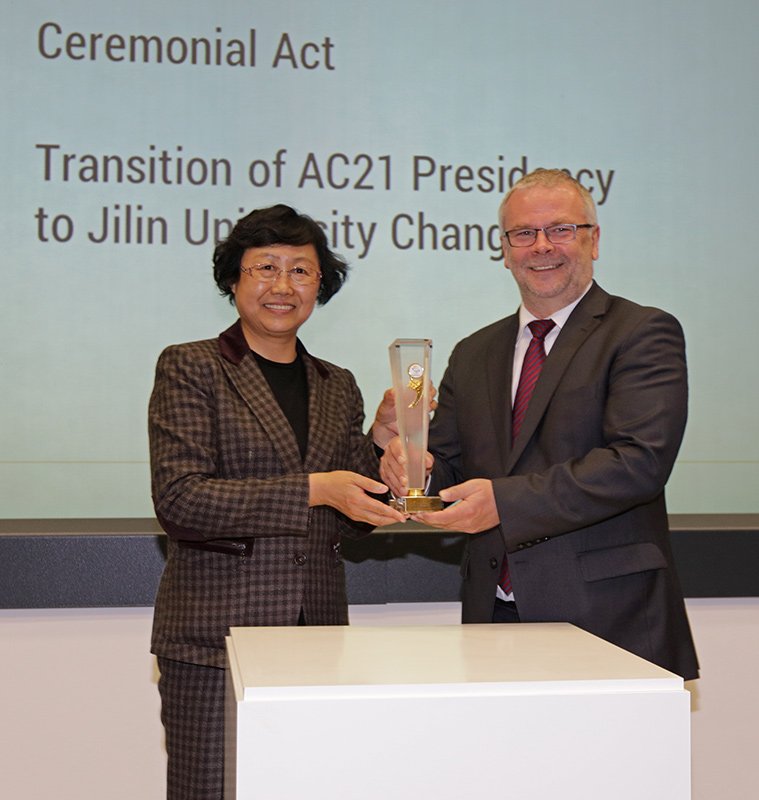
Prof. Dr. Andreas Schubert, Acting Rector of the TU Chemnitz, officially handed over the symbol of the AC21 Presidency to Prof. Li Du, Vice-President of the Jilin University in Changchun, China, who will host the next AC21 International Forum in 2018. -
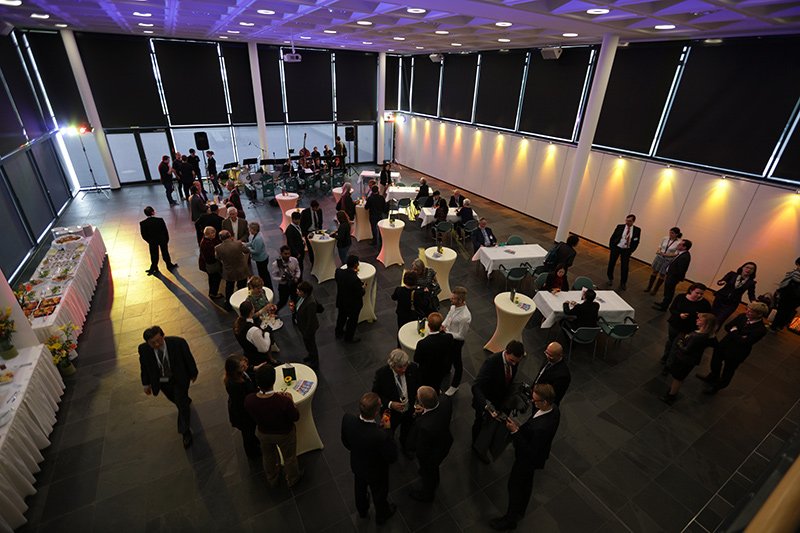
At the Closing Reception, AC21 International Forum guests enjoyed music from the TU Bigband. -
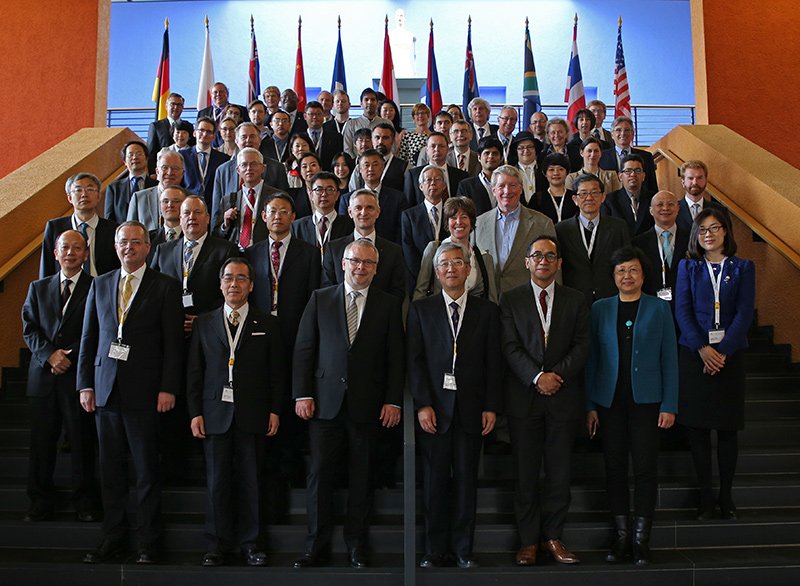
Day 3: Today the scientific program of the conference began. -
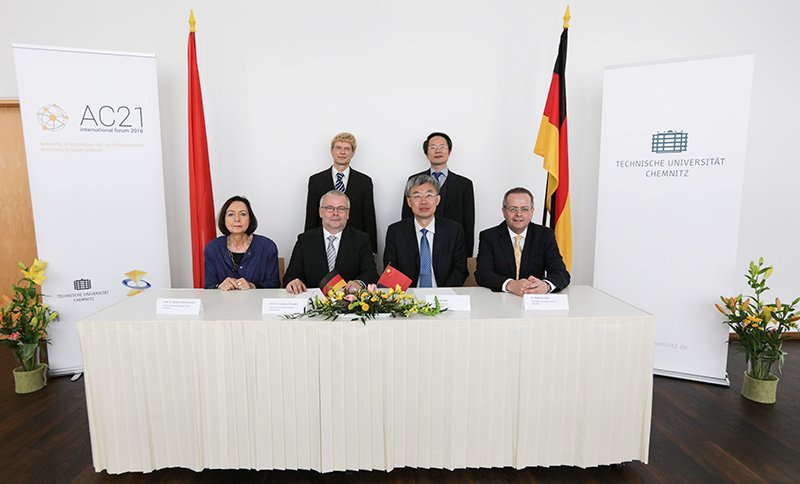
New network: the two AC21 members TU Chemnitz and Nanjing University agreed on a student exchange. -
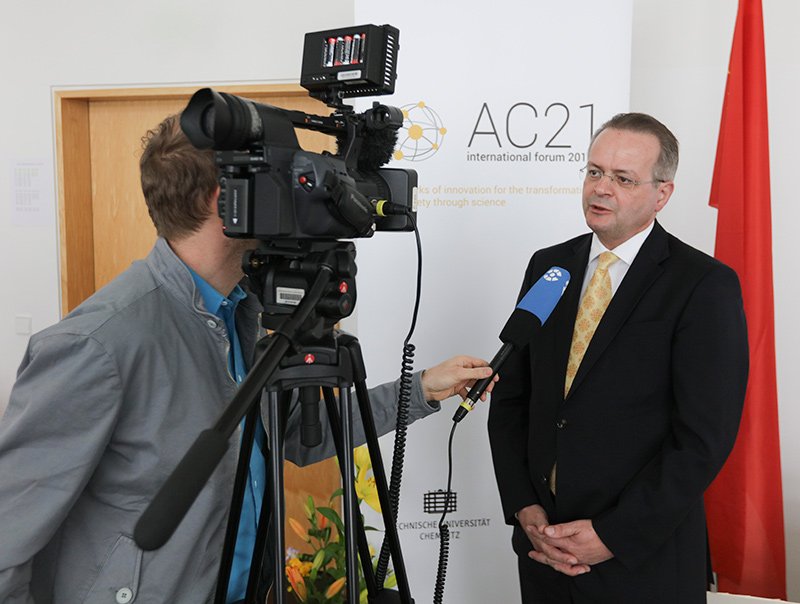
Eberhard Alles, chancellor of the TU Chemnitz and coordinator of the International Forum, answered questions of the media. -
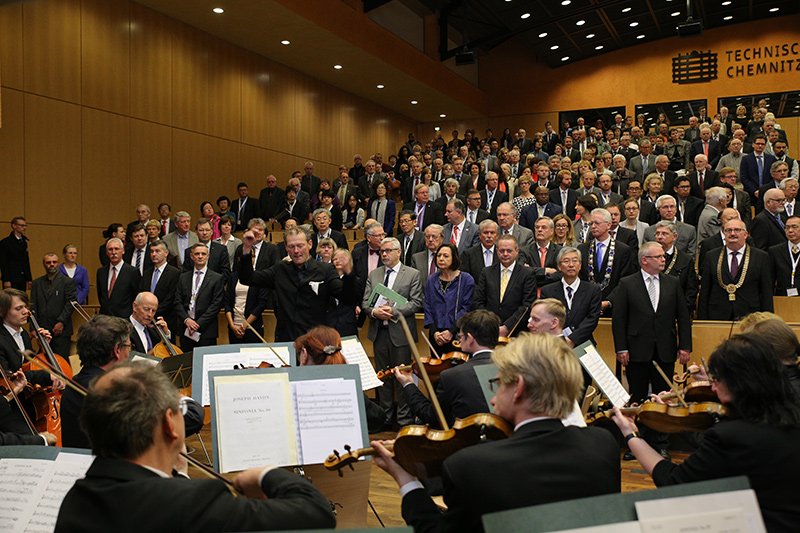
The official opening of the International Forum took place during the anniversary ceremonial act of the TU Chemnitz, which was held in the largest auditorium of the university. -
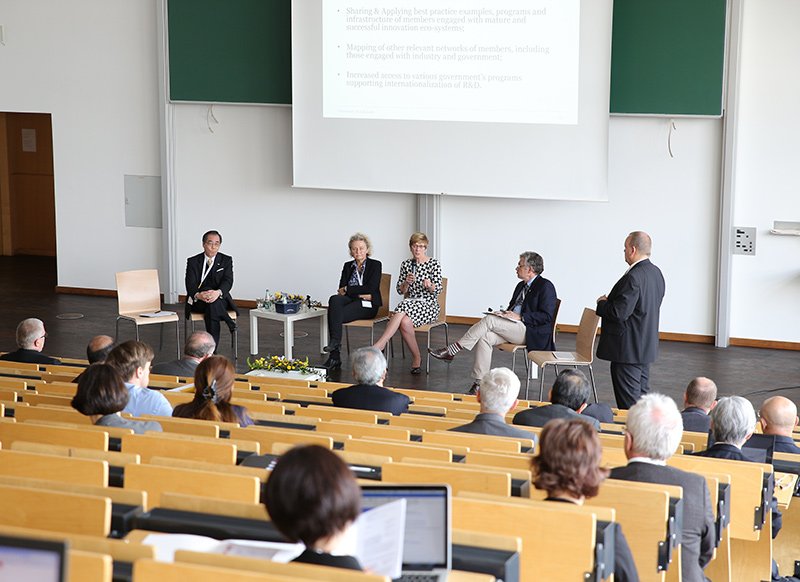
Presidents and Vice-Presidents from AC21 member universities presented their experiences and expertise in achieving excellence in research and research transfer during a plenary panel discussion. -
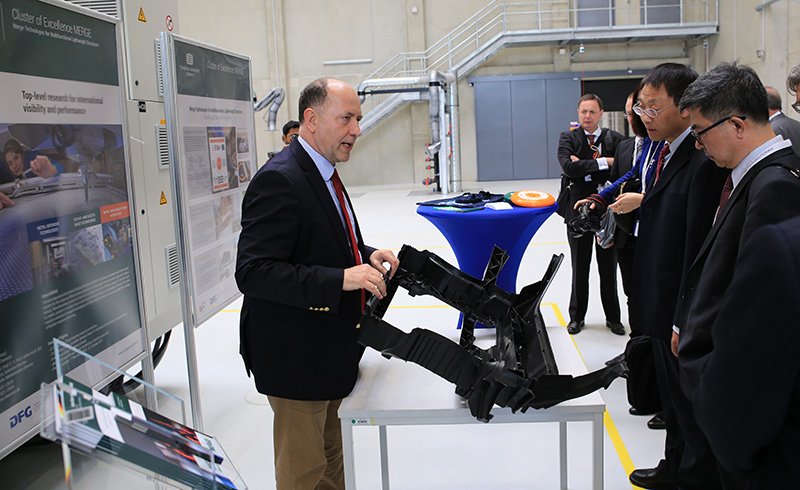
Prof. Dr. Lothar Kroll, CEO of the Federal Cluster of Excellence MERGE, gave the participants a guided tour around the Technology Center of the cluster and presented the Chemnitz research on the subject of lightweight construction. -
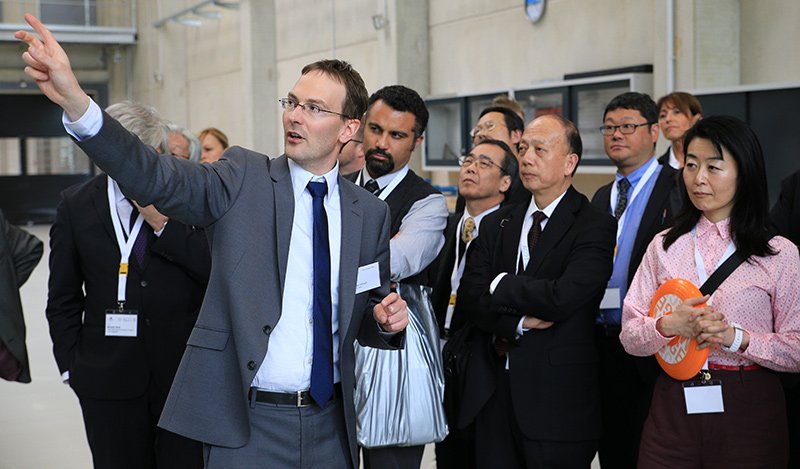
Participants learned that the cluster is concerned with the merge technologies for multifunctional lightweight structures. -
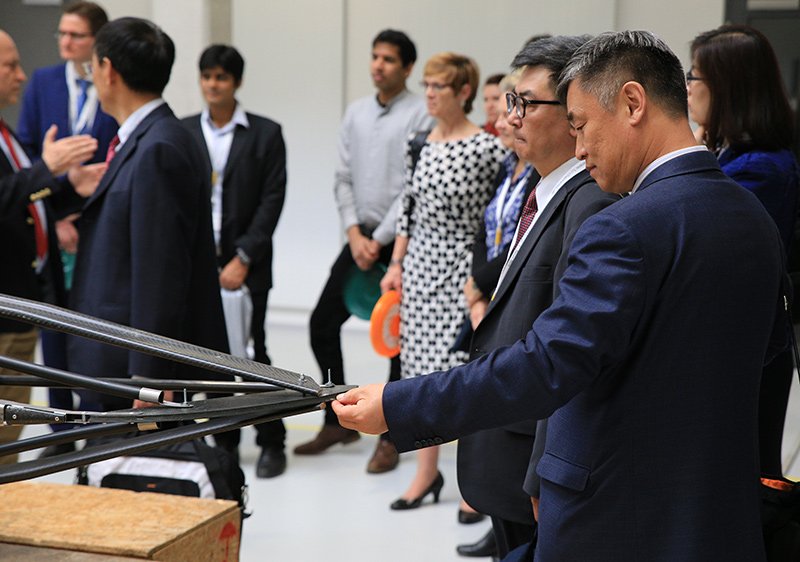
Several demonstrators illustrated the research. -
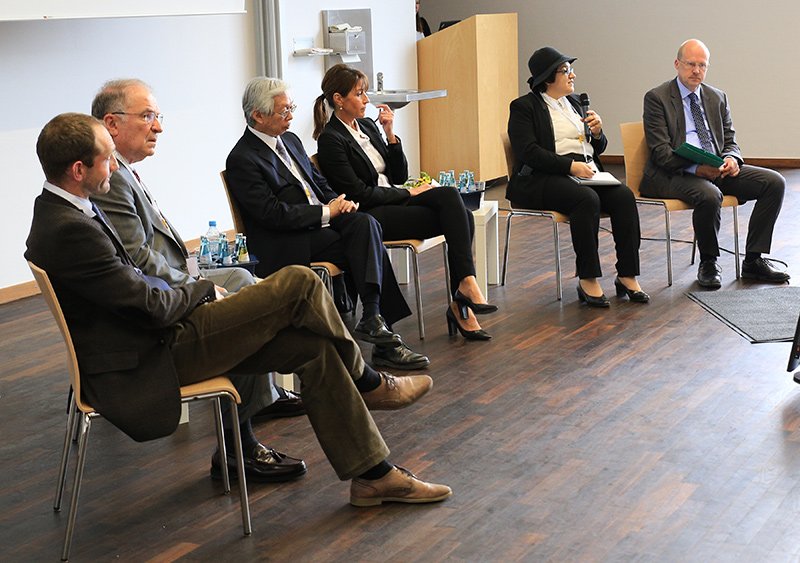
A subsequent panel discussion shed light on the topic of stimulating innovation and an “transfer culture” within trans-disciplinary, cross-sector networks. -
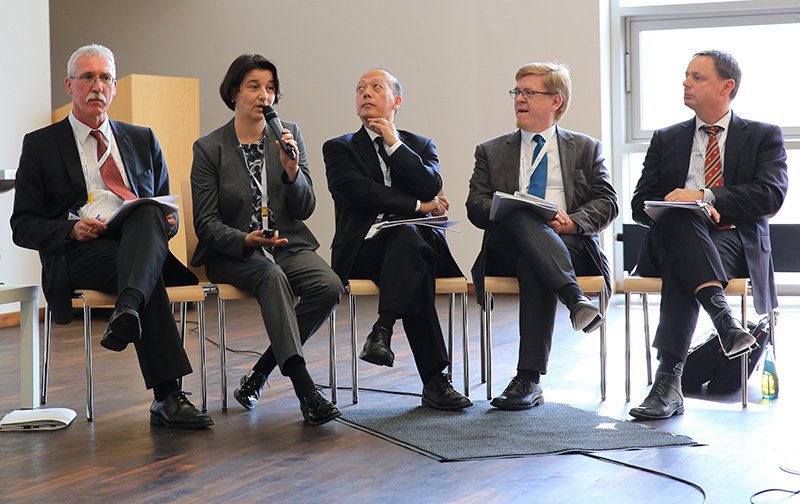
Another plenary panel addressed the topic “Taking next steps in international academic networking”. -
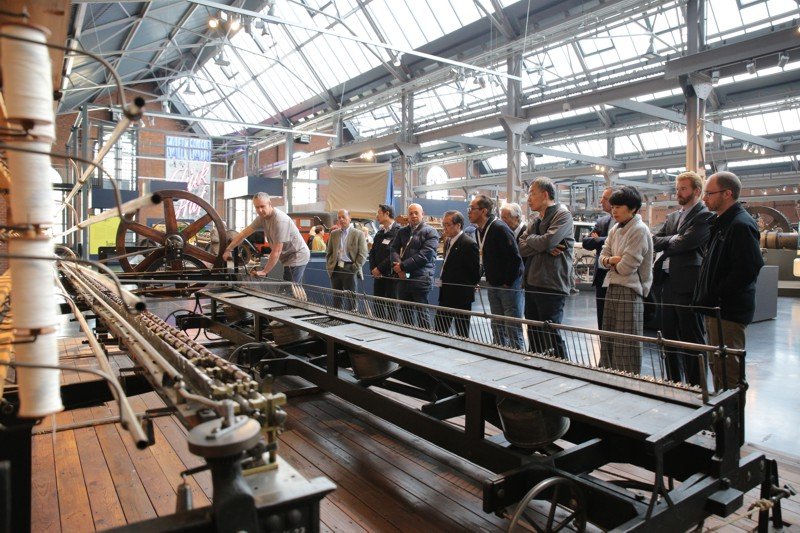
Day 2: The cultural program led the guests among others to the Industriemuseum Chemnitz. -
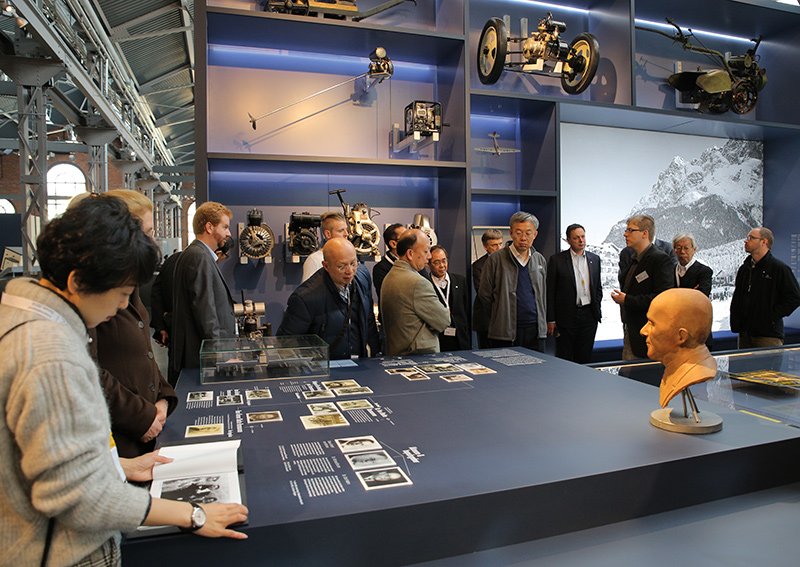
Here, they were given insight into technical as well as social aspects of Saxony’s industrialization. -
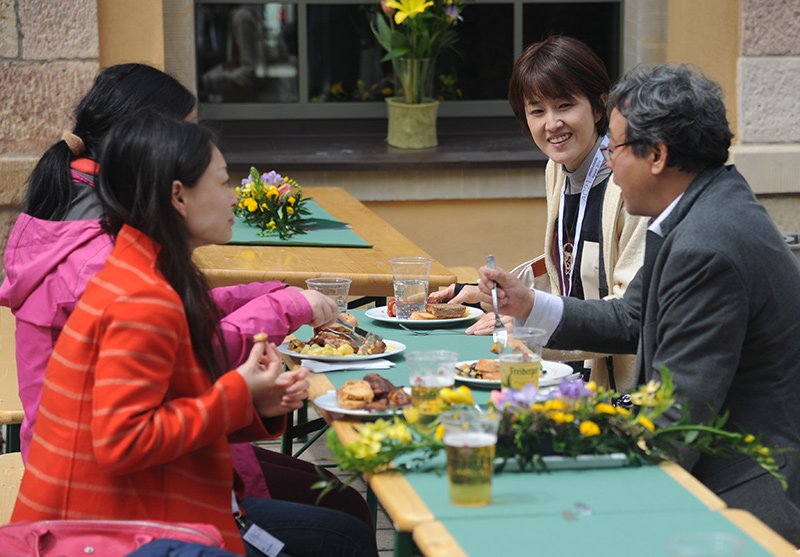
The barbecue was held in spring-like weather. -
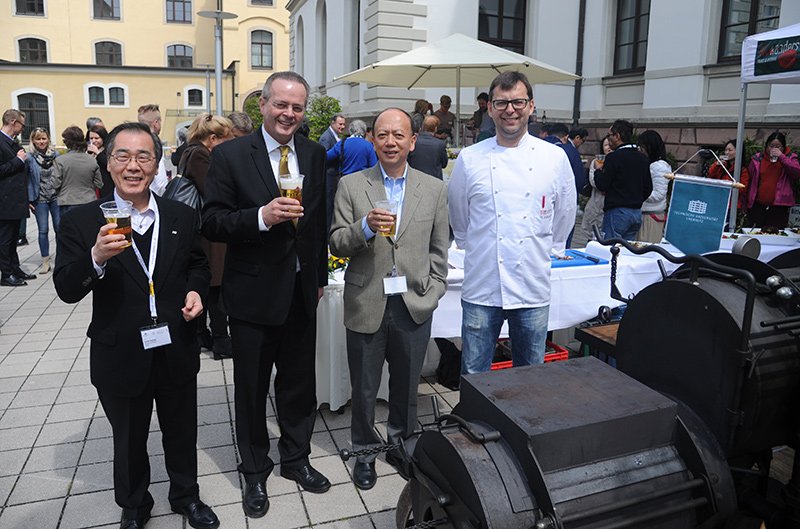
In the courtyard of the TU Chemnitz, participants were able to toast with a glass of Saxon beer. -
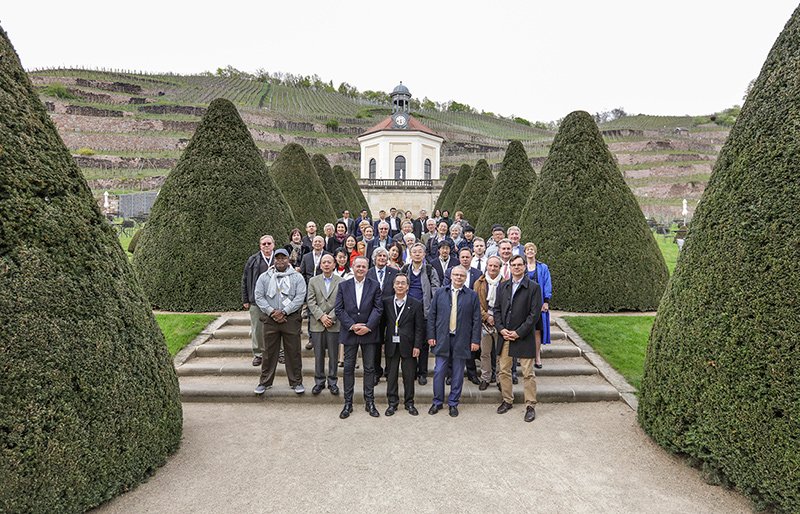
In the afternoon, the group visited the vineyard “Schloss Wackerbarth” in Radebeul. -
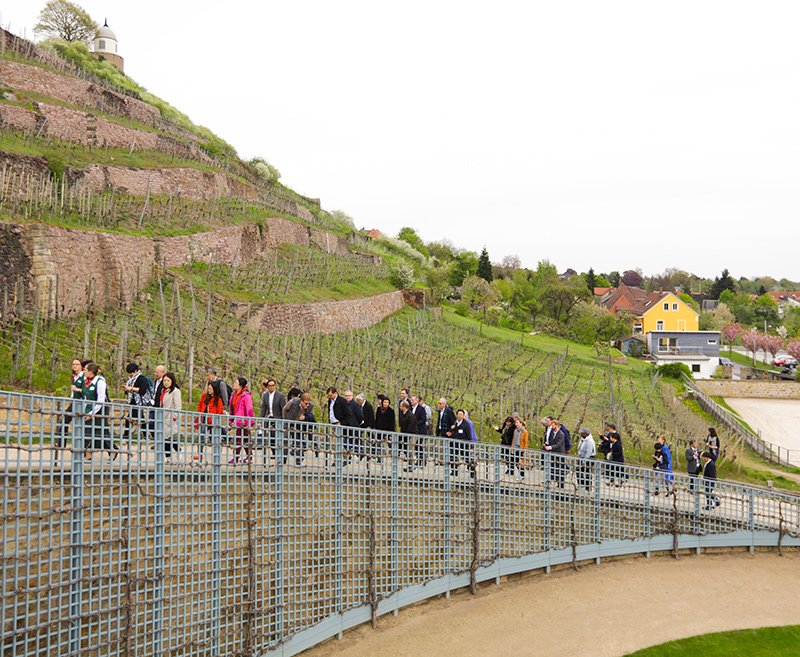
There, the participants learnt more about the Saxon wine-growing during a guided tour. -
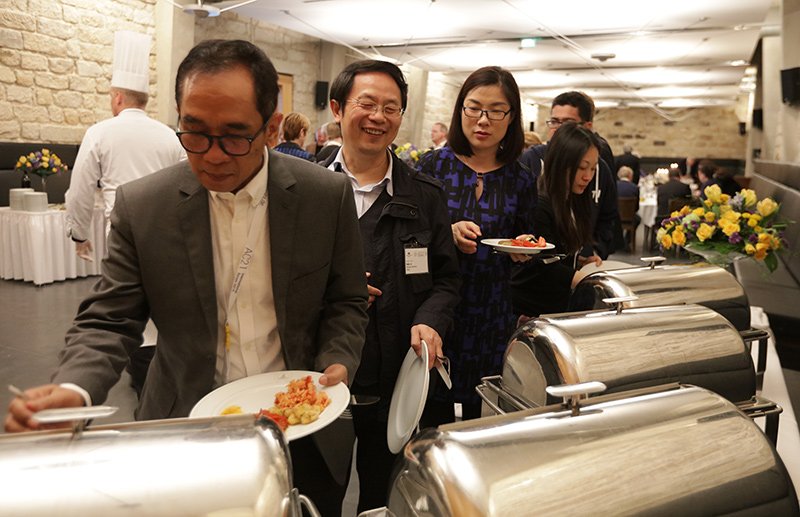
In the evening, they enjoyed a dinner in the wine cellar. -
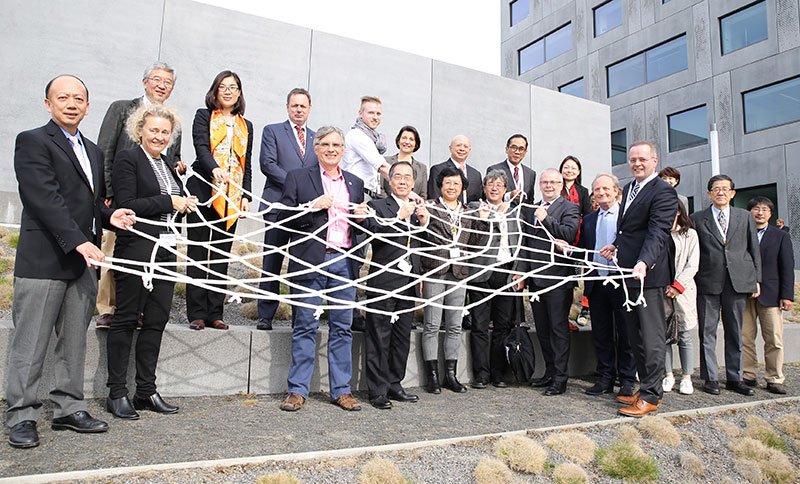
Day 1: International guests visualize the concept of networks. -
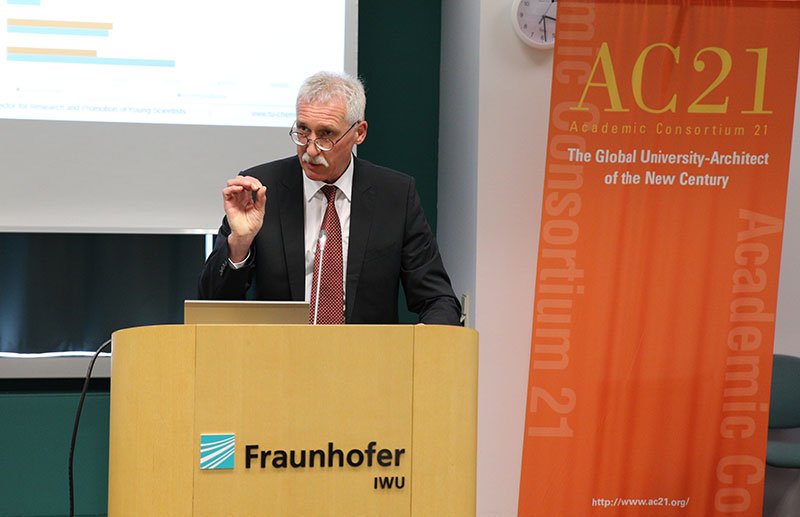
Among those to present during the meeting of the AC21-Steering Committee was the TU Chemnitz Vice-Rector for Research and Promotion of Young Scientists, Prof. Dr. Heinrich Lang, who discussed the results of a “Research Profile Mapping”. -
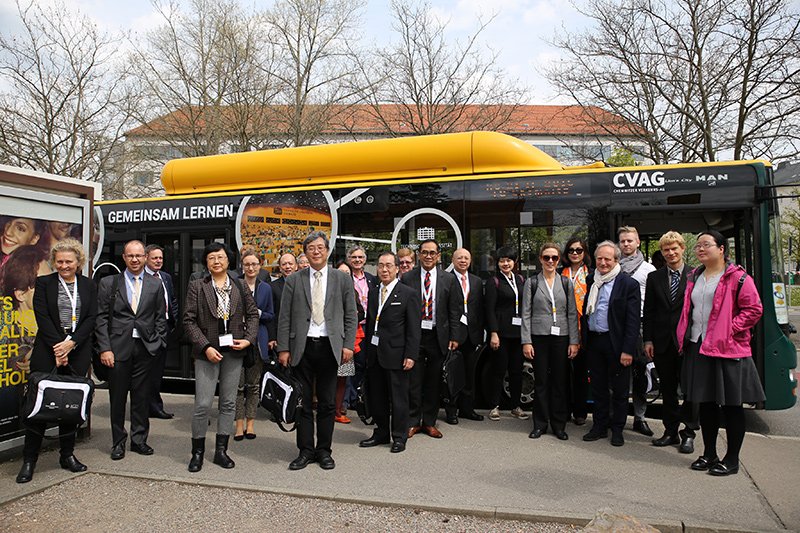
The Chemnitzer Verkehrs-AG deploys a special bus, so that the participants of the International Forum can easily reach the various venues of the event. The bus is designed by the TU Chemnitz – and focuses on the concept of networks. -
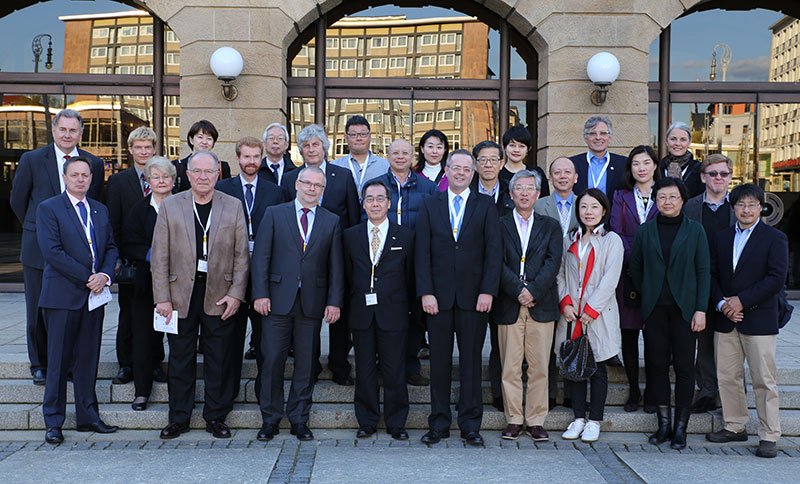
Many participants met on Friday evening to attend the Welcome Reception in the Chemnitz Art Museum.
The 8th “AC21 International Forum”, which is the largest and most important event put on by the “Academic Consortium for the 21st Century (AC21)” network, took place from April 30 through May 3, 2016. Host to this year’s event was the Technische Universität Chemnitz. The forum took place during the course of the Festival Week celebrating the 180th anniversary of the university’s founding. More than 120 guests from AC21 member institutions and partner institutions as well as participants from the university’s external research partners, politics and the economic sector were entertained with a diverse program. This included lectures, panel discussions, workshops and other accompanying activities.
Day 4: Tuesday, May 3, 2016
At the beginning of the conference day, the Fraunhofer-Gesellschaft’s research and technology transfer initiatives were presented to the guests. The Chemnitz-based Fraunhofer Institute for Machine Tools and Forming Technology also presented a cooperation with the Royal Institute of Technology in Stockholm. Here, they take on the challenge of transferring research on heavy vehicles into products in cooperation with companies and other scientific partners. From the Fraunhofer Institute for Electronic Nano Systems ENAS, guests gained an inside view of the work that is conducted with Tohoku University in Sendai, Japan, with whom they have established an active scientist and student exchange program since 2012. Additionally, the Fraunhofer-Gesellschaft model was presented, which represents the close linkage between fundamental and applied research – especially through a strong partnership with universities – as well as global networking.
Afterwards, three parallel sessions took place. Here, presentations were given by representatives of institutions including the University of Minnesota, the German Federal Environment Agency and the city of Saerbeck on the topic of developing a network of communities, universities and administrative agencies regarding the future-oriented topic of renewable energy. Further emphasis was on the Morgenstadt-Project of the Fraunhofer-Gesellschaft, which is carried out in Chemnitz within the framework of a close alliance between the city and university.
Guests spent the lunch break on the university campus and were able to attend the Campus and Sport Fest held by the TU. Afterwards, the AC21 General Assembly Meeting took place. At this session, the hosts of AC21 events in the years 2019 and 2020 were announced. The TU Chemnitz’s bid to organize the 2019 AC21 International Graduate School was accepted. TU Chancellor Eberhard Alles presented the initial plans for this event to the General Assembly and announced the focus to be on technologies for resource-efficiency. Likewise, Kasetsart University Bangkok presented their initial ideas for the International Forum 2020.
Participants of the AC21 International Forum 2016 who did not take part in the General Assembly had the opportunity to take a look at the Department of Electrical Engineering and Information Technology’s laboratories located in the Weinhold-Bau on the TU Campus. From the roof of the building, they enjoyed a view over the Chemnitz Smart Systems Campus which is located in an area directly adjacent to campus and represents successful technology transfer, particularly in the field of intelligent systems.
After a walk through the Fraunhofer Institute for Machine Tools and Forming Technology, this year’s AC21 International forum was brought to a close with the formal handover of the symbol of the AC21 Presidency from the TU Chemnitz to the Jilin University Changchun. The Chinese university will host the next AC21 International Forum in the year 2018. TU Chancellor Eberhard Alles and TU Acting Rector Prof. Dr. Andreas Schubert thanked all international guests during the closing reception for the constructive work that had been done and for the many ideas that were generated during the conference, particularly with regard to the overarching topic: “Networks of Innovation for the Transformation of Society through Science”. These ideas can now be pursued and developed all over the world with the support of the Academic Consortium for the 21st Century (AC21) networks.
Day 3: Monday, May 2, 2016
Today’s conference program began with the official opening of the AC21 International Forum, which was integrated into the 180th Anniversary Ceremony of the TU Chemnitz. During this event, the overarching theme of the International Forum – networks – was particularly in focus.
Afterwards, the sessions of the conference began. The first panel discussion addressed the topic “Achieving Excellence in Research and Research Transfer”. Prof. Wim de Villiers, Rector and Vice-Chancellor of Stellenbosch University (South Africa) – who in his opening statement described the International Forum as an “outstanding conference in a splendid environment” – gave an insight into his university’s definition of excellence: a triad of scientific excellence, social relevance and a transfer which makes products out of research on the one hand and communicates knowledge about research results to society on the other hand. Representatives of other universities also presented challenges and solutions of their institutions related to the subject. In the final discussion, participants talked about the role of AC21 in this field and developed ideas: AC21 could – for example – function as an incubator to promote the cooperation between universities and industry. In addition, the network might be helpful to support the application for national funding projects by bringing universities together.
After lunch, a visit to TU Chemnitz’s Federal Cluster of Excellence “Merge Technologies for Multifunctional Lightweight Structures" (MERGE) was on the agenda. Here, among others, the speaker of the cluster, Prof. Lothar Kroll, gave an overview of the research. As a souvenir, the participants were able to take along a frisbee made at MERGE. It illustrates the challenge the cluster is dealing with: the merging of different materials.
The subsequent panel discussion had the title “Stimulating innovation and a transfer culture within trans-disciplinary, cross-sector networks”. The opening statement was held by Prof. Olfa Kanoun of the TU Chemnitz. She defined the concept of innovation as “turning ideas into manufacturable and marketable ideas”. According to Kanoun, it is important to overcome the gap between prototype and product through combination of basic and applied research.
The last panel of the day made the next steps in international academic networks a subject of discussion. Participants agreed that cooperation can only be effective if one focuses on priority areas. As such, they defined the themes of mobility, joint research projects, joint applications for third-party funding, and the creation of communication platforms.
At the end of this conference day, a field trip brought the participants to Chemnitz’ company NILES SIMMONS Industrieanlagen GmbH. Here they received a closer look at a functioning cooperation between a university and a company. The guests of the International Forum were especially entertained by the guided tour through the production plant.
Day 2: Sunday, May 1, 2016
Today, the participants of the AC21 International Forum had the possibility to learn more about both the City of Chemnitz and the state of Saxony. In the morning, 34 guests enjoyed a tour of the Industrial Museum Chemnitz, and they were impressed by the architecture of the building. One of the international participants found interesting connections to his own scientific field – industrialization. Others praised the holistic approach of the museum, which presents various technical as well as social aspects of Saxony’s industrialization.
For lunch, the guests came together in the courtyard of the main building of the TU Chemnitz. Here they found the possibility to network while enjoying a barbecue, Saxon beer and good weather.
During the afternoon and evening, 47 participants took part in an excursion to the vineyard “Schloss Wackerbarth” near Dresden. Here they were given a glimpse into the production of Saxon wine. A dinner in the wine cellar of Schloss Wackerbarth completed the day.
Day 1: Saturday, April 30, 2016
On Friday evening, participants of the International Forum attended the “Welcome Reception” in the Chemnitz Art Museum. There, they were given the chance to view art from many various art periods in several different exhibits. Afterwards, they had the chance to enjoy relaxed conversations and networking.
The official program of the AC21 International Forum 2016 began with the meeting of the AC21 Steering Committee, which – together with the AC21 General Assembly – is responsible for making strategic decisions for the future development of the network. Along with reports about past AC21 events and from the General Secretariat, several surveys were presented. Among those to present was the TU Chemnitz Vice-Rector for Research and Promotion of Young Scientists, Prof. Dr. Heinrich Lang, who discussed the results of a “Research Profile Mapping”. This was evaluated by the participants as an important basis to further strengthen cooperation in the future. Many additional possibilities for networking were demonstrated by other surveys, for instance regarding student and employee mobility.
On Saturday, guests also had the opportunity to take part in a tour through the city of Chemnitz. The route passed by not only the city’s most famous attraction – the Karl Marx Monument – but also included a tour of the courthouse where visitors could visit the city council hall and climb to the top of the tower.
The 8th AC21 International Forum was officially opened with the Spring Gala in the evening under the patronage of the Saxon State Minister for Higher Education, Research and the Arts, Dr. Eva-Maria Stange. More than 60 guests of the International Forum accepted the invitation to visit the State Museum for Archaeology in Chemnitz, where they enjoyed a program of welcome addresses, cultural entertainment performances and music.
For further information on the 8th AC21 International Forum 2016, please access the following link: https://www.tu-chemnitz.de/international/vernetzung/ac21/if2016/schedule.html.en
(Translation: Sarah Wilson and Katharina Thehos)
Katharina Thehos
04.05.2016




